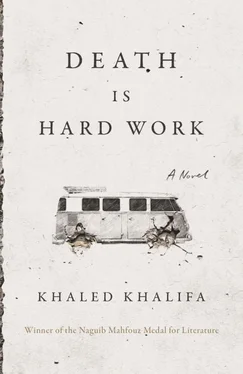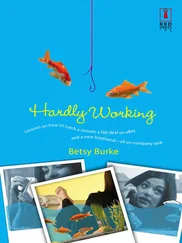Bolbol felt oddly powerful; Lamia’s voice had energized him. Hussein, meanwhile, felt defeated; he hadn’t expected he would need Lamia today of all days. Bolbol had resumed his friendship with her some years earlier. He had met her husband and made a concerted effort to behave like a friend to them both, not an old lover purposely stirring up a husband’s jealousy, as Zuhayr, Lamia’s husband, had believed at first.
In that first meeting, several years after their graduation, he had invited Lamia and Zuhayr to dinner along with two other couples to celebrate meeting again after so long. Hiyam, Bolbol’s wife, and Zuhayr were outsiders in that clique, listening as the ex-classmates laughed and recounted stories of their friends at college. In telling these stories, they realized that, if they were really honest with themselves, not a single one of them had made much of a mark during their student days; they hadn’t made trouble, they hadn’t protested the administration, hadn’t distributed pamphlets for far-right or far-left parties, hadn’t tried hashish or lived on the edge in any way. They’d all been rather pathetically well behaved. To conceal this, they conjured up some additional stories about their own small acts of valor—and all conspired to hide the fact that they were merely plagiarizing untold stories from their classmates’ biographies.
Bolbol wasn’t a source of concern to Lamia’s husband, which was all he really cared to know about him at this moment. The men never became close, but neither were they enemies. Bolbol would never have believed that Zuhayr, a powerful man and a former political prisoner, could ever fear a man like himself, who was afraid of his own shadow. Bolbol wished he could close his eyes and relive all his memories with Lamia and, this time, change things. The poems he had written her, the letters with which he had pursued her over summer holidays… He’d poured his heart and soul into those poems; he liked to believe that, at the very least, she’d found them too amusing to throw away. If she had stayed with him, he would be a different person entirely, he was sure. Lamia would be sad to hear of Abdel Latif’s death; she’d liked him very much. In fact, they had remained close over the years; Lamia would visit or call every now and again, sometimes bringing books by and accepting gifts in return. Equally, she had remained friends with Bolbol’s mother, who’d maintained her tradition of cooking molokhiya for Lamia—the girl’s favorite dish—and she would always insist on giving Lamia a selection of the pickles she was famous for, known locally as Um Nabil’s Miracle. Lamia had always found time to visit Bolbol’s family, and although these visits grew rarer after graduation, they were a sufficient expression of mutual respect and affection.
Now, crammed into his seat and reviewing all these memories, Bolbol realized that his own pickling skills must have come from his mother. Everything he did was a copy. It wasn’t too pleasant to discover that he was just an imitation of his family, repeating throughout his life the very acts he used to despise.
Bolbol said to himself that Lamia was an angel, that she would defend his father’s body with all her strength. The soldiers at the checkpoint into Z were irritated at being unable to “interrogate” these strangers as much as they would have liked—the family would have been rich pickings for any checkpoint. Unfortunately for the soldiers, Lamia had informed Zuhayr of the problem posed by the family’s identity cards, and he had instantly comprehended the delicacy of the situation. He’d beaten them to the checkpoint, bringing along his uncle, who was connected to influential men in the regime, in order to mediate their swift passage through. Bolbol quickly explained their problems, giving a digest of their adventures to date: the congestion at the checkpoints and their difficulty in leaving Damascus in the first place, adding that they had been traveling now for ten hours. The staff at the checkpoint, a mixture of Mukhabarat agents and volunteers from the town, was unsympathetic but didn’t spend too long scrutinizing their papers. They made do with examining the death certificate and then allowed the travelers to pass without even a mutter, though, under other circumstances, and at the very least, the family deserved a good round of cursing out, seeing as they embodied all the necessary qualifications for such—in the view of any checkpoint manned by the Mukhabarat or any of the sectarian groups funded, unofficially, by the regime.
Driving along in the dark, the siblings hadn’t noticed the changes that had overtaken the body. Lamia was upset when she saw the current state of it. Everyone was taken aback by her racking sobs, and her tears caused them to weaken as well. Hussein wept, and Fatima saw her opportunity and plunged into a protracted fit of bawling. Zuhayr acted quickly and drove them to the small public hospital. Thanks to his uncle’s intercession, the hospital director allowed the body to spend the night in the morgue. The terrible burden was lifted. No one looked at Abdel Latif, afraid of finding his body so disfigured that they would agree to dump it in any hole in the ground—even throw it to the stray dogs.
Lamia was slender as a rail, and her long, thick hair was the color of carob. Her face was innocent, and her smile deeply reassuring. She knew no evil and had been born to give without any expectation of return. Now, after all these years, Bolbol supposed that she regarded him as little more than a sick man in need of her care. When they were younger, however, and parted by distance, she’d read his letters and believed that someone else must have written those texts so full of double entendres and poetic flights of fancy. These letters were the venue in which he could say how much he worshipped her. He wrote that it wasn’t right for the throne of a goddess like her to be touched by an ephemeral human—better for eagles to spirit it away while it lay vacant. He still remembered some of his letters by heart, since he’d read and revised and hesitated over them so many times before sending. And then there were the letters he hadn’t sent, which Lamia didn’t even know about—the ones that openly expressed his fervent desire and hunger for her body.
Once, Lamia admitted to him how impatiently she’d waited for his letters throughout the scorching summer holidays in Z, how she was overjoyed when the postman knocked on her family’s door and waved a letter at her with a smile. Bolbol had broken into a sweat when she said this and couldn’t admit that he loved her to tears. Now he believed Lamia was the only ideal that could salvage his life and perhaps even turn him into a less fragile person.
But he had been too afraid of seeing her hurt to admit all this: the scene of what he assumed would be their inevitable separation haunted his thoughts. He didn’t know why, but he was positive it would end badly, that she would say, I love you, but I can’t marry a Muslim. He hadn’t listened to the advice of their mutual friends when they encouraged him to confess his love. They had said that love was more important than marriage; everything else would come later—but on the evening of their arrival at her home, led by her husband, Bolbol felt that he had acted correctly. She wasn’t a hard-line Christian, but in the end she would never have wanted to anger her kindhearted, simple country family, who wouldn’t have been able to pay for a wedding anyhow. Bolbol quickly warmed up to this reasoning and declared himself well satisfied by his paralysis over the years.
Zuhayr was behaving with his usual gallantry. When Lamia opened the door to her house, Bolbol was struck by how exhausted she looked; he regretted having increased her troubles. More than thirty children were inside, eating dinner. Men and women were coming and going through the four open rooms on the spacious ground floor. That Lamia was hosting displaced people needed no explanation. No one could be surprised by the appearance of strangers; everyone was used to new arrivals crossing their path at any time of day or night. Zuhayr saved the siblings their explanations and simply introduced them as old friends from S on their way to bury their father’s body in Anabiya, praising the father as a great revolutionary in the process. Dropping these names was enough of an explanation.
Читать дальше












